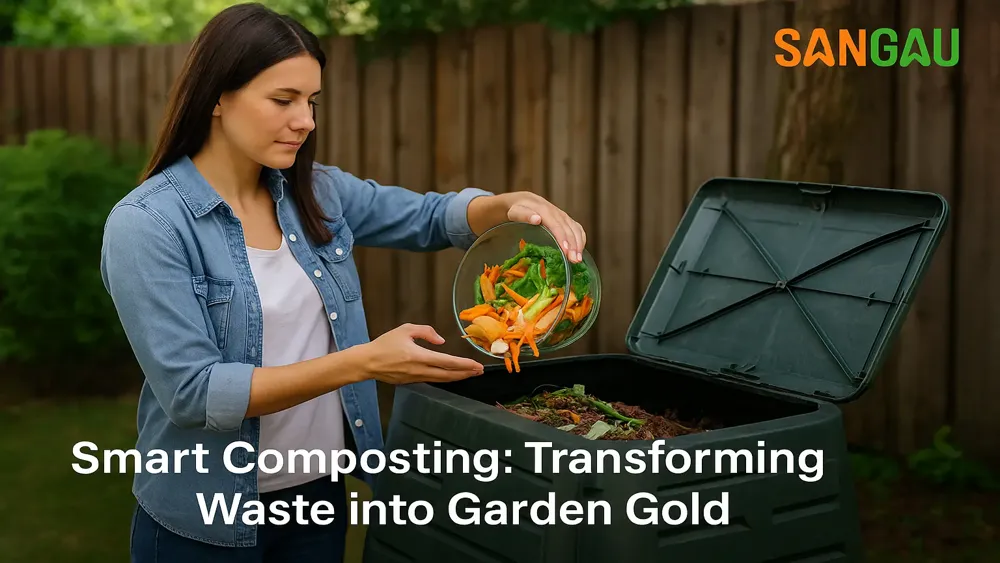Smart Composting - Transforming Waste into Garden Gold
Published : 24 Jun 2025

Smart Composting: Transforming Waste into Garden Gold
Imagine effortlessly turning your everyday kitchen scraps and garden waste into rich, nutrient-packed compost that enhances your plants while helping the environment. Composting is not just a gardening technique; it’s a powerful step toward sustainability, waste reduction, and natural soil enrichment. Whether you’re an experienced gardener or a beginner, composting at home is a simple, rewarding, and eco-friendly practice that benefits both your household and the planet.
The Science Behind Composting
At its core, composting is nature’s way of recycling organic matter into a nutrient-rich soil amendment. Microorganisms break down food scraps, leaves, and other biodegradable waste, converting them into dark, crumbly compost that enriches the soil. This process not only enhances plant growth but also reduces organic waste in landfills, where it would otherwise release harmful methane gas. By composting at home, you actively contribute to a cleaner, greener planet.
Choosing the Right Composting Method
Starting your composting journey begins with selecting the method that best suits your space and lifestyle. If you have a garden, a traditional compost bin or open pile works well. Urban dwellers can opt for vermicomposting, where worms break down organic waste efficiently. Another option is Bokashi composting, a fermentation method that speeds up decomposition. Understanding your needs and available space will help you adopt a composting method that’s effective and convenient.
Setting Up Your Composting System
The right location is key to successful composting. If you’re composting outdoors, choose a shaded, well-drained spot that’s accessible but away from living areas to prevent unwanted odours. Indoor composting setups work best in well-ventilated areas such as under the kitchen sink, on a balcony, or in a utility room. Whether you’re using a compost bin, tumbler, or worm farm, ensuring proper aeration and moisture balance will help accelerate decomposition.
What to Compost and What to Avoid
A balanced compost pile requires a mix of greens (nitrogen-rich materials) and browns (carbon-rich materials). Greens include vegetable peels, fruit scraps, coffee grounds, and eggshells. Browns consist of dried leaves, cardboard, shredded paper, and straw. Avoid meat, dairy, oily foods, and pet waste, as they attract pests and slow down the composting process. Keeping a small kitchen caddy for compostables makes waste separation easy and efficient.
Building and Maintaining Your Compost Pile
To create a thriving compost pile, layer greens and browns, starting with a brown base. Maintain a damp consistency similar to a wrung-out sponge by watering occasionally. Regularly turning the pile aerates it, speeding up decomposition and preventing odours. This simple routine ensures your compost transforms into rich, organic material ready for use in your garden.
Troubleshooting Common Composting Issues
Even experienced composters encounter occasional problems. A foul smell usually indicates excess moisture or too many greens—this can be fixed by adding more browns and turning the pile. If your compost is dry or slow to decompose, it may need more greens or water. Pests can be deterred by burying food scraps deep in the pile and avoiding meat or dairy. With a little attention, these issues can be easily managed.
How to Speed Up the Composting Process
If you want faster results, there are simple ways to accelerate composting. Chop or shred organic materials into smaller pieces to increase their surface area for decomposition. Turning the pile more frequently improves aeration, while adding soil rich in microorganisms boosts microbial activity. Using a compost activator can further speed up the breakdown process, giving you usable compost in a shorter time.
Harvesting and Using Your Compost
When your compost turns dark, crumbly, and emits an earthy smell, it’s ready to use. Sift out any large or undecomposed pieces and return them to the compost pile for further breakdown. The finished compost can be mixed into garden soil, added to potted plants, or used as a natural lawn fertiliser. It’s a sustainable way to nourish plants while eliminating the need for chemical fertilisers.
The Environmental Benefits of Composting
Composting has far-reaching environmental benefits beyond reducing landfill waste. It cuts down methane emissions, enhances soil fertility, and improves water retention in soil, making it particularly beneficial in drought-prone regions. Additionally, composting reduces reliance on synthetic fertilisers, minimising water pollution and supporting biodiversity. Every composting effort contributes to a healthier planet.
Inspiring Others to Start Composting
Composting isn’t just a personal habit—it’s a movement that can inspire communities. Share your composting journey with family and friends, post your success stories on social media, or participate in local composting initiatives. Many neighbourhoods and apartment complexes now have shared composting spaces, making sustainable waste management a collective effort. Encouraging others multiplies the positive impact of composting.
Effortless Composting with SANGAU
For a seamless composting experience, consider reaching out to SANGAU, a trusted property management company committed to eco-friendly living solutions. Whether you’re new to composting or looking to optimise your setup, SANGAU provides expert guidance and practical tools to make composting effortless and efficient. Their support ensures you enjoy the full benefits of composting while contributing to a greener future.
Join the Composting Revolution!
Thank you for joining us on this journey toward sustainable gardening. Composting at home is a powerful step toward reducing waste, enriching your garden, and preserving the environment.
Hashtags:
#Composting #SustainableGardening #EcoFriendly #WasteReduction #SANGAU


